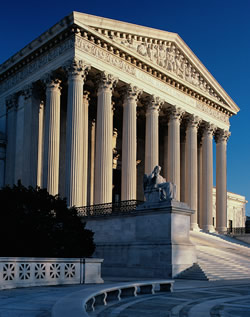
by
“To consider the judges as the ultimate arbiters of all constitutional questions [is] a very dangerous doctrine indeed, and one which would place us under the despotism of an oligarchy.” –Thomas Jefferson
For 200 years, the Supreme Court has enjoyed virtually limitless authority to determine the constitutionality of both state and federal legislation. Known as “Judicial Review,” this power to “…invalidate [an executive or legislative] act if it is contrary to constitutional principles” has made what the Founders believed the weakest of the federal branches into arguably the most powerful.
There is no mention of judicial review in the Constitution. Rather, legal historians believe that famed Chief Justice John Marshall made a personal gift of judicial review to himself and his black-robed progeny in the 1803 Marbury v Madison majority opinion, which he authored. It was in Marbury–the first case “…in which the Court asserted its power to strike down an act of Congress as unconstitutional”– that Marshall wrote “[i]t is emphatically the province and duty of the judicial department to say what the law is.” (my italics)
And for two centuries, the federal judiciary has continued to say “what the law is,” on occasion revealing a stunning penchant for error that the other branches have had no small difficulty correcting and the American people no small difficulty abiding.
However, Congress has the constitutional authority to limit or even undo this extra-constitutional power practiced by the federal judiciary.
Article III, Sections 1 and 2 of the Constitution state:
“The judicial power of the States, shall be vested in one Supreme Court, and in inferior Courts as the Congress may from time to time ordain and establish…” (my italics)
Section 2.
“…In all cases affecting Ambassadors, other Pubic Ministers and Consuls and those in which a State shall be Party, the Supreme Court shall have original Jurisdiction. In all other cases the Supreme Court shall have Appellate Jurisdiction both as to Law and Fact, with such Exceptions and under such Regulations as the Congress shall make…” (my italics)
The language in these two Sections makes it clear that “Congress can unquestionably prevent judicial review by the federal courts altogether by abolishing the inferior courts and repealing the laws dealing with the appellate jurisdiction of the Supreme Court.”
And numerous opinions issued by the Court itself confirm the fact that Congress has the power to effectively end the extra-constitutional practice of judicial review. For in the final analysis, “The whole subject is remitted to the unfettered discretion of Congress.”
The question of course is whether any Congress would bring these options to bear against the Supreme Court or its inferior, federal sisters. Doing so would be constitutional and perfectly legal. And lawmakers would no longer need to depend upon an extraordinary ruling by a rogue Justice to salvage favored legislation, or find a dangerous statute suddenly reaffirmed as the law of the land.
But one can only imagine the outrage from an American public that trusts the Court while exhibiting no faith in Congress! Will a future group of lawmakers have the courage–or the chutzpah–to carry it through?
No comments:
Post a Comment